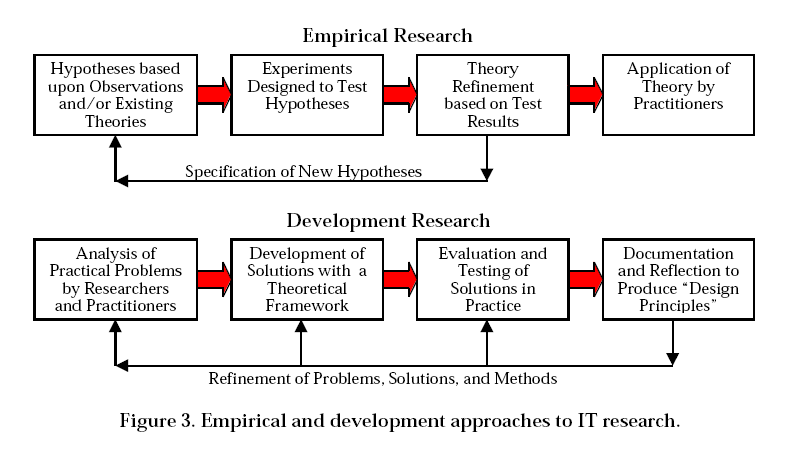Design-based research
Jump to navigation
Jump to search
Definition
According to Reeves (2000:8), Ann Brown (1992) and Alan Collins (1992) defined critical characteristics of design experiments as:
- addressing complex problems in real contexts in collaboration with practitioners,
- integrating known and hypothetical design principles with technological affordances to render plausible solutions to these complex problems, and
- conducting rigorous and reflective inquiry to test and refine innovative learning environments as well as to define new design principles.
What is DBR ?
Design-based reasearch (DBR) in education is probably very old, but recent interest can be traced back to the early nineties, e.g. Brown (1992) and Collins (1992).
More recently, 2 special issues of
- First, the central goals of designing learning environments and developing theories or “prototheories” of learning are intertwined. Second, development and research take place through continuous cycles of design, enactment, analysis, and redesign. Third, research on designs must lead to sharable theories that help communicate relevant implications to practitioners and other educational designers. Fourth, research must account for how designs function in authentic settings. It must not only document success or failure but also focus on interactions that refine our understanding of the learning issues involved. Fifth, the development of such accounts relies on methods that can document and connect processes of enactment to outcomes of interest. (Design-Based Research Collective, 2003).
Reeves (2000:9) draws a clear line between research conducted with traditional empirical goals and that inspired by development goals leading to "Design Principles":
There is clearly an action-research oriented perspective, i.e. researchers must try to change things.
- The overall goal of research within the empirical tradition is to develop long-lasting theories and unambiguous principles that can be handed off to practitioners for implementation. Development research, on the other hand, requires a pragmatic epistemology that regards learning theory as being collaboratively shaped by researchers and practitioners. The overall goal of development research is to solved real problems while at the same time constructing design principles that can inform future decisions. In Kuhn's terms, these are different worlds." (Reeves, 2000: 12).
Reeves's recommendations
Verbatim quote from Reeves (2000:12):
- Focus on chronically difficult problems related to human learning and performance.
- Engage teachers, students, and colleagues in long-term collaborative research agendas.
- Carefully align any prototype technological solutions with instructional objectives, pedagogy, and assessment.
- Clarify the theoretical and practical design principles that underlie prototype technological solutions, and conduct rigorous studies of these principles, their inherent assumptions, their implementation, and their outcomes in realistic settings.
- Share the results of your design experiments in multiple ways, including refereed and commercial publications, web-pages, conferences, and workshops.
- Expect to work very hard. Be patient and persevere. And enjoy the challenge and reward of a career worth having for its contributions to the greater good.
Links
References
- The Design-Based Research Collective (2003) Design-Based Research: An Emerging Paradigm for Educational Inquiry. Educational Researcher, Vol. 32, No. 1, pp. 5
- Brown, A. L. (1992). Design experiments: Theoretical and methodological challenges in creating complex interventions in classroom settings. The Journal of the Learning Sciences, 2(2), 141-178.
- Collins, A. (1992). Towards a design science of education. In E. Scanlon & T. O'Shea (Eds.), New directions in educational technology (pp. 15-22). Berlin: Springer.
- Thomas C. Reeves, Enhancing the Worth of Instructional Technology Research through Design Experiments and Other Development Research Strategies, Paper presented on April 27, 2000 at Session 41.29, International Perspectives on Instructional Technology Research for the 21st Century, a Symposium sponsored by SIG/Instructional Technology at the Annual Meeting of the American Educational Research Association, New Orleans, LA, USA. [1]
